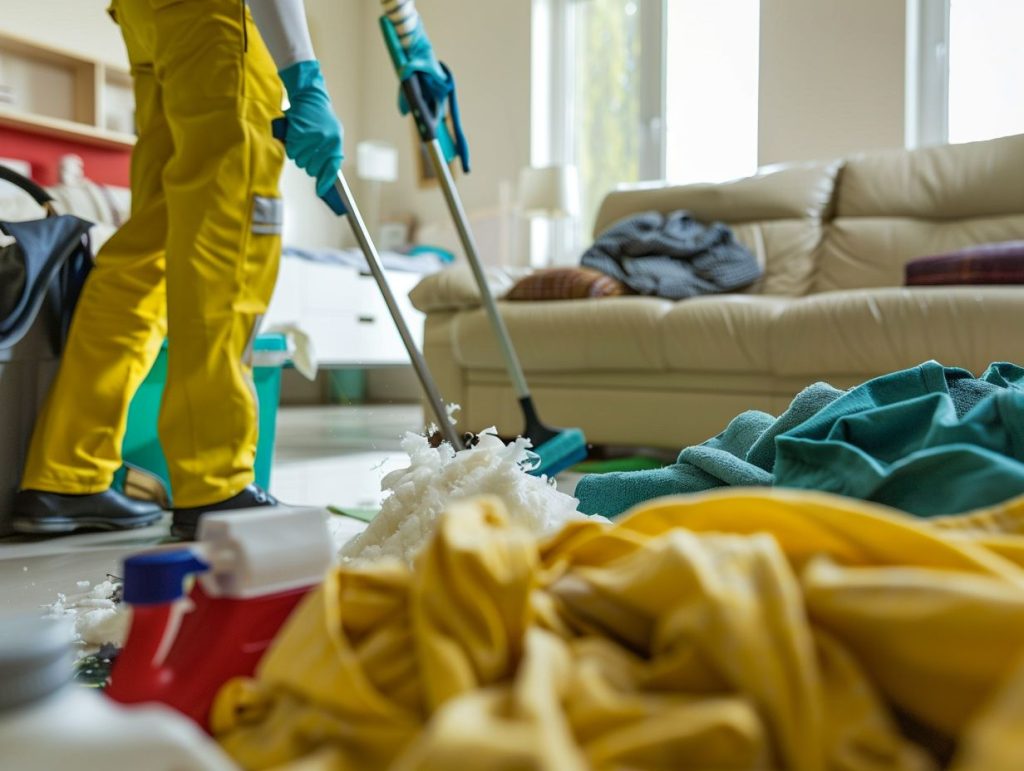Ready to tackle your spring cleaning but not sure where to start? Uncover the secrets of professional cleaners to help you achieve top cleaning results at home! From the physical and mental benefits of spring cleaning to preparing and executing a room-by-room cleaning guide, we have tips and tricks to make your cleaning process more effective and efficient.
Learn how to maintain a clean, tidy space with daily and weekly habits for a clutter-free home.

What is Spring Cleaning?
Spring cleaning is more than just a quick tidy-up – it’s a deep clean that prepares your home for the new season. It’s all about giving your place a fresh start and tackling those areas you usually ignore in your day-to-day cleaning routine.
Spring cleaning has been a tradition in many cultures since ancient times. It’s like a reset button to welcome the new season and eliminate leftover winter vibes. This thorough cleaning isn’t just about your physical space—it’s also about decluttering your mind and feeling refreshed.
By letting go of the old stuff and making room for new energy, spring cleaning sets you up for a fresh beginning and sets the tone for the rest of the year.
Benefits of Spring Cleaning
When you do spring cleaning, you’re not just tidying up your physical space but also giving your mind a fresh start. Getting rid of dust, allergens, and clutter doesn’t just make your place look better; it also creates a healthier atmosphere where you can hang out.
Physical and Mental Benefits
When you tackle spring cleaning, you’re not just sprucing up your space—you’re doing your body and mind a favour. By removing dust and allergens, you’re paving the way for better air quality in your home, which can do wonders for your respiratory health.
And it’s not just about physical perks; decluttering and organising can also work wonders for your mental well-being. Say goodbye to anxiety and hello to a sense of calm in your freshly cleaned space.
Studies have also found that a tidy environment can boost productivity. So, when you tackle spring cleaning, you’re not just making things look nice but also giving your overall well-being a major boost.
Preparing for Spring Cleaning
To succeed in your spring cleaning endeavour, you must get all your essential cleaning tools and products lined up. Make sure you create a detailed cleaning schedule to clean every nook and cranny of your home thoroughly.
Gathering Supplies and Making a Plan
When you’re gearing up for spring cleaning, it’s crucial to gather all your cleaning tools and products in advance and lay out a detailed cleaning plan. A solid spring cleaning checklist can be a lifesaver, guiding you smoothly through the process.
To kick off your spring cleaning spree, ensure you’ve got all the basics handy – like a trusty vacuum cleaner, some microfibre cloths, a mop, a bucket, and a scrubbing brush. If you’re all about being eco-friendly, consider using cleaning alternatives like vinegar, bicarbonate of soda, and essential oils instead of harsh chemicals.
Set yourself up for success by creating a cleaning schedule that breaks down tasks room by room. For instance, you could start by decluttering and dusting the living room and then tackle deep cleaning the appliances and worktops in the kitchen. By assigning specific time blocks to each area, you’ll keep things organised and stay laser-focused throughout the cleaning process.
Room-by-Room Cleaning Guide
To make spring cleaning easier, you need a room-by-room guide. This guide gives specific cleaning tips and time-saving tricks for every part of your home, guaranteeing a thorough and smooth cleaning session.
Tips and Tricks for Each Area
Each area of your home requires unique cleaning tricks and tips to get it looking spotless. Whether dusting, vacuuming, scrubbing, or disinfecting, using the proper techniques makes a difference.
Start by clearing off the worktops in your kitchen and giving them a good wipe-down with an all-purpose cleaner. Don’t forget to focus on cleaning appliances like the hob, fridge, and microwave.
For the bathroom, grab a grout brush to tackle those tile grout lines and use a disinfectant spray on all the high-touch surfaces like taps and door knobs.
In the living room, vacuum your upholstered furniture and dust off your electronics with a microfibre cloth. Consider using special tools like a mini vacuum attachment for those tricky spots, and opt for eco-friendly cleaning products for a more sustainable clean.
Deep Cleaning Techniques
When dealing with stubborn stains, grime, and funky odours that your usual cleaning routine can’t handle, it’s time to bring out the heavy-duty deep cleaning techniques. These methods are your secret weapon for getting every nook and cranny squeaky clean, making your space tidier, healthier, and more inviting.
Effective Methods for Tough Stains and Grime
In tackling tough stains and grime, you need to know the right cleaning tips, products, and techniques to get the job done and ensure those areas are thoroughly cleaned and disinfected.
If you’re dealing with common stains on fabrics, like coffee or wine spills, a mixture of washing-up liquid and hydrogen peroxide can be your secret weapon. Put the solution on the stain, let it sit for a bit, and then dab it with a clean cloth.
For those oily kitchen stains, a bicarbonate of soda paste can be a real game-changer—apply it, gently scrub it, and rinse it off.
And don’t let mould and mildew linger—a mixture of vinegar and water sprayed on those surfaces can help eliminate them and prevent them from returning.
Maintaining a Clean Home
If you want to keep your home clean, you’ve got to stick to a regular cleaning schedule and use some smart home maintenance hacks. These time-saving tricks will make it easier to maintain a tidy space without too much hassle.
Daily and Weekly Habits for a Tidy Space
Incorporating daily and weekly habits into your cleaning schedule is crucial for keeping your space neat. These routines will help you manage household chores and stop clutter from taking over.
One of the best habits is making your bed every morning. It sets a positive tone for your day and instantly makes your bedroom look more organised. Taking a few minutes for a quick tidy-up each evening can stop messes from piling up and make cleaning feel less overwhelming. By scheduling specific cleaning tasks for certain days of the week, like hoovering on Mondays and cleaning bathrooms on Fridays, you can make sure no area of your home gets neglected for too long.
